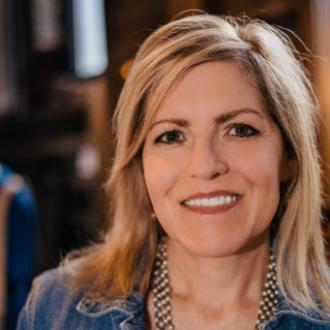
Category: Uncategorized (Page 6 of 9)
By Russell White
“Before you are a leader, success is all about growing yourself. When you become a leader, success is all about growing others.” -Jack Welch, chairman and CEO of General Electric between 1981 and 2001.
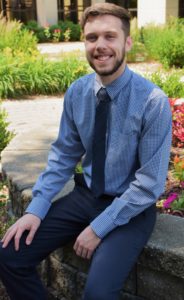 My name is Russell White and I graduated from Drake in May of 2018 with a Bachelor of Arts degree in Politics and International Relations. I currently serve as an AmeriCorps VISTA member with the Iowa Mentoring Partnership (IMP) at Volunteer Iowa. My work is related either to capacity building and sustainability for mentoring programs, or I am engaging in outreach via social media, email and phone. I am tasked with helping give technical assistance to mentoring programs and helping them create the structure their programs need to be successful in serving Iowa’s youth. Often, I get the pleasure of listening to personal stories from mentors, mentees and parents/guardians about the amazing impact mentoring has on their lives. Nothing is more fulfilling than knowing that you are helping to improve the lives of children across an entire state; knowing that you truly are making a difference it people’s lives. But, I didn’t end up at the IMP randomly, it was quite deliberate. For you see, I am passionate about youth development and mentoring. Why? Well, I myself am a mentor. I mentor a young boy named Aiden who attends Monroe Elementary School, which is not that far from Drake University’s campus.
My name is Russell White and I graduated from Drake in May of 2018 with a Bachelor of Arts degree in Politics and International Relations. I currently serve as an AmeriCorps VISTA member with the Iowa Mentoring Partnership (IMP) at Volunteer Iowa. My work is related either to capacity building and sustainability for mentoring programs, or I am engaging in outreach via social media, email and phone. I am tasked with helping give technical assistance to mentoring programs and helping them create the structure their programs need to be successful in serving Iowa’s youth. Often, I get the pleasure of listening to personal stories from mentors, mentees and parents/guardians about the amazing impact mentoring has on their lives. Nothing is more fulfilling than knowing that you are helping to improve the lives of children across an entire state; knowing that you truly are making a difference it people’s lives. But, I didn’t end up at the IMP randomly, it was quite deliberate. For you see, I am passionate about youth development and mentoring. Why? Well, I myself am a mentor. I mentor a young boy named Aiden who attends Monroe Elementary School, which is not that far from Drake University’s campus.
I began mentoring Aiden in the fall semester of 2017 of my senior year at Drake. At the time, Kerry King of Fraternity and Sorority Life (FSL) put together a new service opportunity between Drake FSL and Monroe Elementary’s afterschool program. When I first heard of this opportunity I was excited by it, mostly because I enjoy volunteering with kids; it is honestly a blast. The Spring before, a group of FSL students attended Monroe Elementary for several hours and spent time with the kids. We read them books, talked with them and even played a few games with them. Needless to say, it was perhaps one of the best ways to volunteer. So, upon hearing about this new opportunity to spend time at Monroe Elementary once a week for an hour with their afterschool program it seemed like a no-brainer! A handful of other Drake students and I signed on to be volunteers in the fall of 2017.
Upon my first visit to Monroe I was taken outside with the kids to the playground. That is when I met Yolanda Shields, the director of the afterschool program, and, as I would learn, a terrific individual to be around. After meeting her and explaining I was a Drake student here to volunteer, she quickly referred me to a student of hers that was writing a book and needed help. Since I was a college student, both her and the student thought I could lend a little bit of help. That student was Aiden. Our first day together Aiden and I sat at the base of the jungle gym and spent the entire time working on his story. At first, this might seem only like a cute activity that he and I did together on our first day. However, prior to sitting down with Aiden I was informed that Aiden has ADHD. So, sitting down for a long period of time and focusing on one particular thing doesn’t exactly come naturally to him. At the same time, he sometimes gets so hyperactive that he bounces off the walls in his classroom and causes both disruption and trouble. Sitting down with Aiden, it became clear to me that he was not at all a bad kid. He is similar to most kids his age: has a hard time with sharing, loves to play video games, has a silly sense of humor and just loves to play around. He and I hit it off on my first visit to Monroe and I had informally become his mentor.
I would go back to see Aiden most weeks; I did my best to try every week, but sometimes I could only do every other week. But every time I would walk through the door and he saw me a big smile would grow on his face. Those moments always felt rewarding. He and I would almost do the same thing whenever I came to visit him. We would go out into the hallway, sit down on the floor, I pull out my phone and we begin to watch video game clips on YouTube. At the time, Aiden’s video game obsession was a 2D dungeon/adventure/mining scroller called Terraria. Luckily, I knew of the game prior to him showing me and that excited him that I knew what he was talking about. He and I began to bond over video games and we would show each other videos and just watch them every time I visited. But, I would also get him to play some board games with me, like Candyland, Battleship and even Chess. Surprisingly a 10-year-old kid likes to play Chess.
At the same time though, I would talk with Aiden about how things are at home. How school and class was going. Just anything that was going on in his life, and he would open up more and more to me with every visit. I would also try to work with him on how he interacts with other students; teaching him to be more kind and more willing to share with his classmates. By the end of my senior year, I could already see a difference in his behavior. To see and witness the change in him was such a rewarding feeling. But, my time with Aiden also had an affect on me. It made me more responsible and considerate of others. Whenever you’re a mentor, you have to be reliable and consistent with your mentee. That consistency and reliability translated to other aspects of my life. It also just made me happier, to be honest. Being around Aiden and simply playing games, watching video games and hanging out had a real positive impact on my own mental health. It also inspired me to keep mentoring and to help spread the culture of mentoring. Because of my time with Aiden, I have become passionate about the mentoring field which is a considerable reason for why I chose to serve with the Iowa Mentoring Partnership. I still mentor Aiden to this day. In fact, I intend to see him tomorrow after work and bring in his favorite snack: Takis.
People underestimate the power and impact of mentoring. The impact of a mentoring relationship doesn’t just affect the mentee, but it affects the mentor and the parents/guardians too! In a mentoring relationship, you are helping your mentee realize THEIR potential, while the mentee is helping you realize YOUR OWN potential and worth as well. You build each other up and it is a beautiful dynamic to be a part of. You become a friend, a big brother/sister, a role model. You’re just there for them. It is as simple as that. Someone they can count on and know that no matter what, they (you) will be there. It is one of the most rewarding feelings you could ever receive in life. All the while, I only spent one hour a week with him. That is only four hours a month. Think about all of the hours you spend in a month doing practically nothing. So, let me ask you this: What will you do with your four hours? Nothing? Or change a kid’s life for the better?
By Amy Knudsen, Professor of “Homelessness in America”, SCSS 076
In putting together my class, Homelessness in America, I knew that the best way to fully understand this complicated and multi-layered problem was to provide an opportunity for service learning.
This was accomplished by connecting with community organizations that spoke to the class on a variety of topics, conducting volunteer work at local shelters and designing and implementing a class project that would educate the Drake community on the issue.
Continual reflection was utilized by journaling, speaker reflection papers and reflecting on the group work and project. In addition, I asked students to reflect on what citizenship means, do they believe that volunteering is a necessary part of community and the role of the government in responding to the issue.
We had eight speakers from local organizations speak at the class and students volunteered at Central Iowa Shelter and Services and Iowa Homeless Youth Center’s (IHYC) Outreach Center. Students cleaned, sorted donations and made tie bags for residents.
For the group project students wanted to educate the Drake community on youth homelessness and we partnered with IHYC for the project. Another class on campus, LEAD 100, was also doing a similar project so we combined our efforts. The event, held on April 18th provided a homeless simulation for students and students made tie blankets for the youth. In addition, donations of personal hygiene products were collected. Approximately 25 students attended, 17 blankets were made and several boxes of donations collected.
The success of the class was seen in the student’s reflections:
“..this class and this project have taught me so much about homelessness that I could not have gotten anywhere else. The tours and speakers helped me conceptualize what we learned in class, and this event further helped that. I hope that our project will open the eyes of other students across campus, and maybe even start to break down the stigma a lot of us have. Even if we help just one homeless person, or change one person’s mind, it’s worth it.”
“I learned a lot through this experience, in many way I did not really expect. Going into this class, I expected to learn about homelessness but I was not aware that we would able to do things that actually help out the homeless. Through the event, I learned all of the work that goes behind planning a large donation event like this and just how difficult it can be to gather support for the issue you are trying to address. That is something that shelters and nonprofits face every day and I was extremely unaware of that. The simulation at the event also helped enforce the ideas that I had learned in class. I became aware of just how unpredictable homelessness is and how you can be faced with large obstacles at every turn that completely turn your world upside down.”
“Through this semester, I feel like I have learned a lot about myself. I’m sure that all freshman say that as they leave their first year of school but I feel that this class has really helped with my own internal growth. I learned about my passion for volunteering. I volunteered when I had the time in high school but seeing all this injustice brought to light around me has made me want to step up and do more. Volunteering makes a big difference in so many people’s lives and I’m sad that I haven’t done more of it until now. I have already set up a monthly volunteering spot at a local homelessness shelter back home and at the local food shelf so I’m eager to get home and help out even more. I have also learned how to better work in a group setting. I worked with groups of people I didn’t know a lot this semester and it really helped me grow a lot as a person.”
“The most important thing that I have learned throughout this experience is the crisis of youth homelessness and how it can affect education. As someone who grew up in a stable household I never considered how hard it would be to have to move schools all the time because you didn’t have a stable home. The effect of these moves on a person’s education was something that I had not considered and had never really thought about. I also never considered how hard it would be to access personal hygiene as a homeless youth. Most schools have showers in the locker rooms, but if a person is constantly switching schools or even no longer attending school this does not help them. Along with that most people donate clothing of food items and not pads and tampons or other more expensive and less socially glorified items that are necessary for women to have and use.”
Benjamin Franklin once said, “Tell me and I forget. Teach me and I remember. Involve me and I learn.” And I think this was true this semester.-
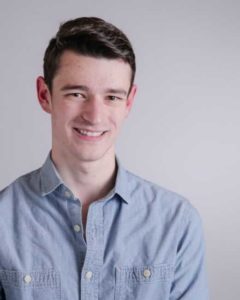 Alright, so quick introduction, I’m Tate Clemen. Currently, I’m pursuing a B.S.B.A in Accounting and Finance and a B.A. in Theatre, and I’m originally from the Kansas City area.
Alright, so quick introduction, I’m Tate Clemen. Currently, I’m pursuing a B.S.B.A in Accounting and Finance and a B.A. in Theatre, and I’m originally from the Kansas City area.
So, last year as I was making my second round of visits to Drake, I was talking with my admissions counselor, Evan, and we were discussing different scholarships that Drake offered. The Engaged Citizen Corps (ECC) came up, and, being so involved in service, I thought I’d look into it a little more. I ended up applying and got an interview with Amanda. In the car, on the way home from my third and final visit to Drake, I got the email that I had been accepted. That was one of the things that helped to secure the deal for me.
At the beginning of the year, we started the first part of the in-class section of the programs with FYS 024, “The Common Good,” which consisted of only the nine members of the ECC. This class was centered around Robert Lupton’s book Toxic Charity. Lupton’s book is a critique of the charitable industry, and shows the need for organizations that eliminate dependency and are sustainable. The ideas of his book had always been in the back of my head, but once put in words and examples, it was easy to see he was right. But this knowledge especially helped when transferring it to our worksite.
After a short “speed-dating” style of interviews with each partner site, I was paired with the Des Moines Music Coalition (DMMC). The DMMC is a Des Moines based non-profit whose main goal is to turn Des Moines into a “music city” through education and various advocacy projects. Their most known project is the implementation of the 80/35 Music Festival every July.
Going into the internship I had virtually no expectations, because I knew that it wouldn’t matter what work I was doing as long as I had the passion for cause, which I found with the DMMC. I soon discovered that I would be working as a Digital Marketing and Communications intern, working on various projects around the office, everything from designing and producing a new website to reorganizing our storage unit. The Music Coalition is quite a bit different than the other organizations the ECC works with, because they do not necessarily deal with what one would usually see as a “social problem” like poverty or homelessness, but instead the untapped potential of the Des Moines music and art scene. When people think of Des Moines, their minds usually don’t go straight to music, as it might with Nashville or New York. Due to this mission, my work with the Des Moines Music Coalition has helped me integrate myself into the Des Moines community, and further my understanding of the art scene in the city, and the struggles that it holds.
In my time with the DMMC, it has become very apparent that the government within Des Moines is limiting the growth of the scene. This is currently an ordinance within the city limits that dictate that if a music venue’s revenue is over 50% alcohol sales, then anyone under 21 is not allowed in after 9pm. This highly limits smaller venues like Lefty’s or the Vaudeville Mews from fulfilling their potential. A majority of Drake’s population is under 21, and with Lefty’s being within walking distance from campus, there is a huge market that cannot be tapped due to Des Moines’ ordinance. It was important to first understand what was happening within the music scene, and then I was able to see the DMMC’s vision and mission.
One of the largest projects that I’ve worked on is the Music Coalition’s new website. Jarin, the executive director, wanted to completely overhaul the old website and wanted something that resonated more with our target market. The old website read as “a nonprofit website,” and we wanted to cater to where a majority of the DMMC’s patrons reside, in the younger, millennial generation. We wanted to represent a feeling and an idea, a feeling of fun and of what we are truly about.
This experience has really helped me to get a greater grasp of the Des Moines community, and the need for the presence of art in the form of music within the city. It has also given me the opportunity of seeing the inner workings of how a nonprofit works. Almost all of my prior experience with the nonprofit industry was on the front lines, what is referred to as “direct service,” what people would usually think of when talking about volunteer work. But very seldom do people get to see the behind the scenes of an organization. This program has helped me apply what I’m learning in class to “the real world,” and helped expand my views of the world and the nonprofit industry.
“Art is the only serious thing in the world. And the artist is the only person who is never serious.”
― Oscar Wilde
Written by: Tate Clemen
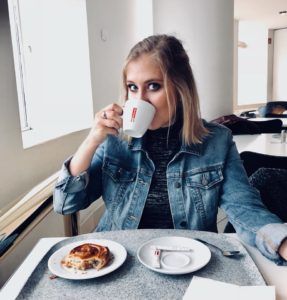 Hi! I’m Emily Larson. I’m the Service Learning Ambassador for IRIS, the Iowa Radio Reading Information Service. I’m a sophomore News, Magazine, and Writing major. As a student in the J54 class, I read for IRIS. I loved the impact such a simple service was having on the community. Reading the news for the blind and print handicapped helps people all over Iowa. And all I had to do was go to the basement of Meredith Hall and read the Council Bluff’s Daily Nonpareil! The first time I read I was super nervous. I figured I’d mess up and ruin the news for all those people. But with the help of the SLA who trained me, I read for an hour and enjoyed it. The worst part was that I forgot a water bottle and my voice was pretty sore afterwards. Now, when I train students, I always tell them to bring water—it’s a lot of reading after all. Students from the J54 class read for IRIS as a requirement of the course, but I like to make it more than that. Service isn’t about what you’re getting, a grade, it’s about what you’re giving. I try to stress that during trainings. In the booth, I tried to spice things up with a couple posters. One of them is a “5 W’s of IRIS” poster that reminds students of why they’re doing what they’re doing and who it’s for, and a whole lot of sparkle. The other one is a “reflection” poster. After they’re done reading, students can take a popsicle stick and draw a little face on it and put it on an outline of Iowa, representing someone in Iowa they’ve helped that day. It’s cheesy, but I think little things like the posters and upbeat training sessions remind the students that what they’re doing is important. They’re not just reading into a microphone in a booth in the basement, they’re actually helping real people.
Hi! I’m Emily Larson. I’m the Service Learning Ambassador for IRIS, the Iowa Radio Reading Information Service. I’m a sophomore News, Magazine, and Writing major. As a student in the J54 class, I read for IRIS. I loved the impact such a simple service was having on the community. Reading the news for the blind and print handicapped helps people all over Iowa. And all I had to do was go to the basement of Meredith Hall and read the Council Bluff’s Daily Nonpareil! The first time I read I was super nervous. I figured I’d mess up and ruin the news for all those people. But with the help of the SLA who trained me, I read for an hour and enjoyed it. The worst part was that I forgot a water bottle and my voice was pretty sore afterwards. Now, when I train students, I always tell them to bring water—it’s a lot of reading after all. Students from the J54 class read for IRIS as a requirement of the course, but I like to make it more than that. Service isn’t about what you’re getting, a grade, it’s about what you’re giving. I try to stress that during trainings. In the booth, I tried to spice things up with a couple posters. One of them is a “5 W’s of IRIS” poster that reminds students of why they’re doing what they’re doing and who it’s for, and a whole lot of sparkle. The other one is a “reflection” poster. After they’re done reading, students can take a popsicle stick and draw a little face on it and put it on an outline of Iowa, representing someone in Iowa they’ve helped that day. It’s cheesy, but I think little things like the posters and upbeat training sessions remind the students that what they’re doing is important. They’re not just reading into a microphone in a booth in the basement, they’re actually helping real people.
Hi everyone!
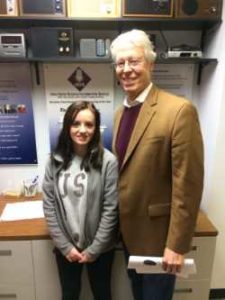
Following my acceptance to Drake University in 2016, I had mail coming from the university almost every week. Pamphlets, brochures and flyers all began piling up on my desk, but one item really caught my eye. One of the pamphlets contained opportunities for service learning at Drake and after coming from a high school with a service learning curriculum I was intrigued. Service learning had given me some of my most memorable experiences in high school, so I wanted to be able to continue service learning in high school. I decided to apply for the Engaged Citizen Corps (ECC) program that was listed in the pamphlet because the idea of being with 9 or so other first-years that were as passionate about service learning excited me. I hoped that the program would allow me the chance to make friends with other students that wanted to be engaged in their community.
Now that I am almost done with the ECC program, I feel that I have gained so much more than just friends. As part of ECC, I have had the opportunity to intern at the Iowa Radio Reading Information Service for the Blind and Print Handicapped (IRIS), which is a non-profit that reads print materials over the radio to those who would be unable to read them on their own due to blindness, visual impairment or a physical disability. Through interning with IRIS, I have made connections with people off the Drake campus and have learned about disability access. I feel that my internship with IRIS has personally popped the ‘Drake bubble’ for me because my eyes have been opened to so much that goes beyond campus life.
One of my most memorable experiences with IRIS was helping with the coordination of the Big Band Bash in the fall. I had a lot of responsibility put on me because I had to make sure the minor details of the event were taken care of prior to arrival, assist in photographing, checking people in and helping the guests. I was pretty nervous about the event, but I put all my effort into it and later my director, Maryfrances, thanked me for everything that I had done! I felt a lot more confident following the event and was able to see that although I was young that I could be a great help to my internship. I also was able to mingle amongst the guests at the event, many of whom are blind or print handicapped. Through this interaction, I was able to learn more about the blindand print handicapped community in Iowa and really understand the importance of the service that IRIS was offering them. Many of the guests exclaimed their thankfulness for IRIS which made me realize the importance of disability access.
While the Big Band Bash stands out in my mind, a lot of my time at IRIS has been spent doing more “behind-the-scenes’ work. As an intern, I am tasked with the responsibility of making the organization run smoother and often that means getting things ready for the director. I have played around with a lot of different software programs, tinkered with radios and made tons of excel spreadsheets. While initially I did not see the importance of the work that I was doing, I began to see how important it was to my director. As I worked on small projects, it saved her time and she was able to do more things important to running the organization like applying for grants. I’ve realized that when you’re working the small tasks may seem unimportant, but they contribute to the larger goal of the organization.
The other component of the ECC program outside of the internship is the curriculum at Drake. As an ECC member, I have taken a seminar class specific to ECC each semester, an FYS about the common good, and am currently in a Sociology class about social problems. In the FYS, we read Toxic Charity and discussed the importance of service that empowers those who you are serving. I was able to draw connections between what I was learning in the classroom and what the work of IRIS was doing. I saw how IRIS empowered its listeners by giving them access to information that they would be unable to do on their own. Using this information, they could make informed choices about politics, their community, current events and even know what the deals are in the grocery store! I also formed strong bonds with the other ECC members through talking about our personal beliefs and experiences. My personal beliefs were challenged and opened through our dialogue.
I am grateful for my experience in the ECC program and plan to continue my service-learning next year as the Student Learning Ambassador for IRIS at Drake. I hope to spread more information about the importance of disability access and encourage other students to become involved with the work that IRIS is doing. I hope to expand on what I have already learned through ECC and continue to grow as both a student and a public servant to my community. I hope that next year’s class of ECC students have the same great experience that I had!
Written by: Katie Carlton
On the morning of Saturday March 3rd, 2018, I walk into Grace Lutheran Church for the Feed Greater Des Moines conference, eager to learn about Des Moines’ food systems and what is being done here to help those in need. Right of the bat I got what I was looking for with the first keynote speaker, Nick Kuhn. Kuhn graduated with a degree in civil engineering but was never truly satisfied with what he was doing. He started a food truck business with the Justice League of Food and began looking for ways to give back to the community. He and the food trucks started by donating leftover food to the Central Iowa Shelter and Services (CISS) but realized that was simply a Band-Aid for those at the shelter and not really solving any long-term problems that the residents at CISS face. He knew he could be doing more by ‘teaching a man to fish’ instead of ‘giving a man a fish’ so he bought a space in Valley Junction that has a bar and a commercial kitchen. This opened up an opportunity for the chefs of the food trucks to rent and have an adequate space to prepare meals for the day, as long as the chefs agreed to take on residents of CISS as apprentices and workers. This is great for the residents of CISS who get into the program because they have a chance to make a living wage and learn valuable skills for future job opportunities in the food industry. This is just a small summary of Kuhn’s operation that is growing and taking off.
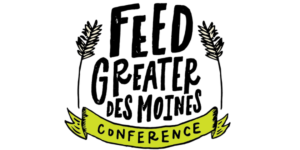
I found his story very inspiring and it’s not done yet. I believe he is constantly looking for ways to improve what he’s doing in his own project and what he can be doing for the community around him. I struggle to remember that there is always something that can be done to help those in need, and this conference has reminded me of countless ways to better our community and better the lives of those in the community. Food insecurity was a large topic discussed at the conference whether it was surrounding those who live at CISS or families who are the working poor and don’t always have enough to buy food. This topic relates directly to Next Course Food Recovery here at Drake which I have the pleasure of working for out of the Community Engaged Learning & Service office as a Service Learning Ambassador.
Food recovery, or rescue, is something that I have become very passionate about within my first year at Drake. This new position I have taken on has allowed me to network and learn more about what is happening locally and globally in the food scene. I think it’s very important to attend conferences like Feed Greater Des Moines and other local or nationwide conferences to tell stories of success and stories of loss, to learn what other service systems are out there, and to realize how we all fit together in the larger picture of our shared goals of social, environmental and food justice for all. I strongly believe that if we collaborate together, advocate for each other, and keep pushing forward for equal opportunities for all, in good time, we can achieve these goals together.
By: Catie Mullen
Hello my name is Danielle Dircks! I am a first-year Neuroscience major from Omaha, Nebraska and a member of the Engaged Citizen Corps (ECC). The Engaged Citizen Corps has given me the opportunity to strengthen my passion for service through unique class experiences, an internship, and exposure to the Des Moines Community.
I was first introduced to the Engaged Citizen Corps when I was a senior in high school. My Drake admissions counselor took one look at my resume, saw my passion for helping others, and recommended this program. The ECC allows me to use what I am learning in the classroom and apply it to the real world. As a first-year student, I was required to take a First Year Seminar (FYS). Because I am a member of the ECC, I was put into an FYS entitled The Common Good. In this FYS, myself and the eight other members of the ECC dove into the world of service. We used the book Toxic Charity, written by Robert Lupton, to address some of the misconceptions involved with service work. His book mainly addressed the idea that even when you have the best intentions, you can do more harm than good, especially if you are not looking at the impact of your work on those you are trying to serve. The most important thing in service should be the people you are trying to serve.
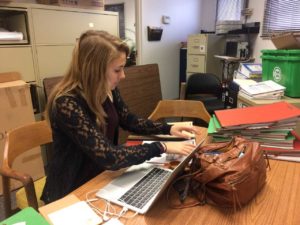 In addition to taking specific classes, the ECC partnered me with a local non-profit where I was able to put into action what I have been learning. I have been working with HOME Inc., an affordable housing non-profit, as a research intern. My main task has been to conduct a research study to generate measurable outcomes for the work HOME Inc. has been conducting. I spent last semester collecting data. I went through over a hundred files from the last 30 years collecting information on our clients and on the houses that we have sold to them. I looked at things such as property value prior to HOME Inc. buying the house, the property value after HOME Inc fixed it up, the price the client paid for it, the size of the family, and their income. Now that I have all of the data collected, I am starting to analyze it. I am looking for trends, commonalities, and irregularities. The main goal of this study is to see what impact HOME Inc. has had on the surrounding neighborhood through looking at specific questions such as, has housing retention rate in those areas increased? Through their revitalization work, have they increased property value? Not only are we looking at the neighborhood, but also the families. Does having a stable place to live allow for an increased income? Do the children of the homeowners go on to finish high school or attend college?
In addition to taking specific classes, the ECC partnered me with a local non-profit where I was able to put into action what I have been learning. I have been working with HOME Inc., an affordable housing non-profit, as a research intern. My main task has been to conduct a research study to generate measurable outcomes for the work HOME Inc. has been conducting. I spent last semester collecting data. I went through over a hundred files from the last 30 years collecting information on our clients and on the houses that we have sold to them. I looked at things such as property value prior to HOME Inc. buying the house, the property value after HOME Inc fixed it up, the price the client paid for it, the size of the family, and their income. Now that I have all of the data collected, I am starting to analyze it. I am looking for trends, commonalities, and irregularities. The main goal of this study is to see what impact HOME Inc. has had on the surrounding neighborhood through looking at specific questions such as, has housing retention rate in those areas increased? Through their revitalization work, have they increased property value? Not only are we looking at the neighborhood, but also the families. Does having a stable place to live allow for an increased income? Do the children of the homeowners go on to finish high school or attend college?
This research project has allowed me to take what I love, experiments and research, and apply it in a different environment. Between the classes I have taken and my internship, the ECC has given me a new perspective with which to view the world. Most college students live on a bubble on their campus. They aren’t exposed to the community around them. This is especially prevalent with the Drake campus, since the area surrounding it doesn’t match the demographics of the school. This new lens the ECC has created has opened my eyes to the realities many people living not too far from myself face. I have decided that the phrase, “I understand” will no longer be a part of my vocabulary. No matter how much I want to fully empathize with someone, every single person is different. People living in poverty (notice the people first language) experience things that I cannot relate to. My perspective will always be different from theirs. As one of my professors says, “even if we are sitting no more than five inches from each other, you will still be able to see things that I can’t. No matter where we are physically positioned in the room, we will never see the same things. Just as we will never experience the same thing and thus never know exactly how the other feels”. I am fortunate enough to have always known where my next meal was coming from, or how I was going to pay for my books for school. Unfortunately, that isn’t the case for everyone.
The Engaged Citizen Corps has allowed me to broaden my horizons, learn about the interworkings of a non-profit, and think about service in ways I probably wouldn’t have otherwise. It opened my eyes to something called people first language, instead of saying “poor people” to say “people living in poverty” because their socioeconomic status doesn’t define who they are as a person. The Engaged Citizen Corps encompasses the full meaning of service learning through its ability to connect what I am learning in classes, both my ECC classes and my neuroscience classes, to what I am doing out in the community. Through application, my knowledge doesn’t just lay static in my brain, it gets applied to my daily life in ways I never anticipated.
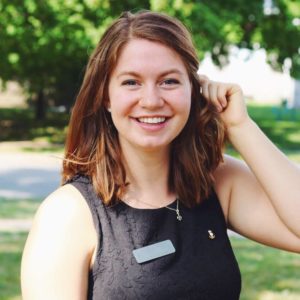 Hi! My name is Julie and I currently work as the Food Security Coordinator for Next Course: Food Recovery Network at Drake. I am a double major in Sustainability & Resilience and Rhetoric, Media, & Social Change with a minor in Sociology and am both passionate about Next Course and see it as an intersection of my two major areas of study.
Hi! My name is Julie and I currently work as the Food Security Coordinator for Next Course: Food Recovery Network at Drake. I am a double major in Sustainability & Resilience and Rhetoric, Media, & Social Change with a minor in Sociology and am both passionate about Next Course and see it as an intersection of my two major areas of study.
Next Course recovers excess food from Drake’s campus that would otherwise be thrown away, and donates it to one of five local partner agencies on a rotating triweekly basis. When I first started my position, I was encouraged to visit and get to know the people and mission behind each of our partner agencies. This led me to schedule tours at Central Iowa Shelter and Services (CISS) and YMCA Supportive Housing Campus. Touring both of these local charitable organizations alongside other Drake students allowed me to see the complex and immense effort of local individuals to help, support, and enable people in need. The tour at CISS revealed all the services that are provided there beyond meals, such as job application workshops, a hydroponic garden, and Veterans Assistance apartments. I was utterly inspired by the psychological and sociological considerations put in by CISS faculty to address local issues. Working for Next Course has not only broadened my perspective about Des Moines, but also lead me to new considerations about my future career path.
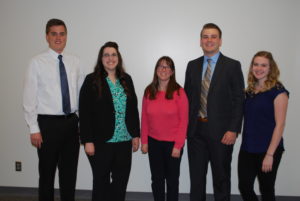
ISCPA Audit Team: John Nicholson, Elizabeth Cokel, Michelle Thompson, Neal Usry and Rachel Schaefer
Masters students in Jaime Grandstaff’s internal auditing class were able to apply what they were learning in the classroom this spring by meeting real community needs. Half of the class partnered with Youth Emergency Services & Shelter of Iowa (YESS) to review employee expense reimbursements, and the other half worked with the Iowa Society of Certified Public Accountants (ISCPA) to review cash receipts. The students worked closely with staff at the organizations throughout the semester and then provided final reports on April 17.
In addition to the projects, panels of subject matter experts from businesses across the area came to class, and some classes were also held at Principal Financial Group and Wells Fargo. Together, these experiences provided opportunities for networking, real-world experience, and job and career options. To read more about the outcomes of this class and hear from those involved, check out http://news.drake.edu/2017/05/12/drake-internal-auditing-course-partners-with-iscpa-and-yess/.
“With this being a new course and a new community engagement project, I had a lot to learn about how to set it up,” said Grandstaff. “The Community Engaged Learning team helped me through the process with what forms needed to be completed and who I needed to talk to with all aspects of the project.”
There are many benefits of incorporating a community engaged learning component into a course. For more information, resources, or to explore community partners, visit www.drake.edu/servicelearning or contact the Director of Community Engaged Learning at renee.sedlacek@drake.edu.